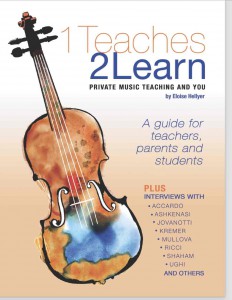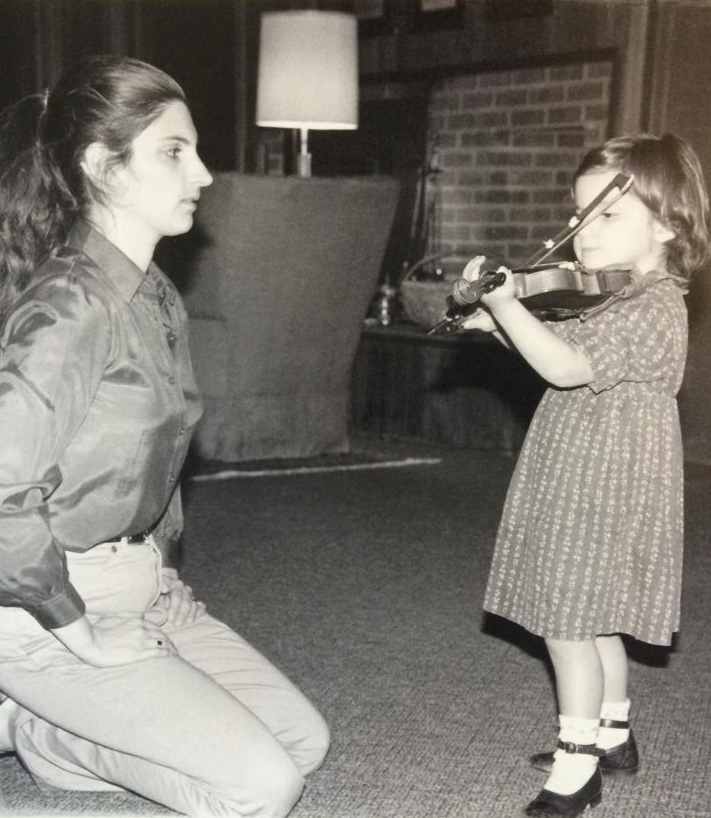Auditions and Overly Ambitious Students . . .
“How do you handle students wanting to audition for things when they are unlikely to succeed? For example, a local middle school where I have a lot of students has an honors orchestra starting in 6th grade. Most of my students are successful in auditioning (when they start violin lessons in 4th grade or earlier), but occasionally I have a student I know just isn’t at that level yet but really wants to try out. In the past I have let them try, but I feel that it’s kind of a lose/lose situation as they are disappointed and we’ve wasted time working on material they are unable to master.”
This question, asked by a young but experienced teacher, raises a thorny issue. How do you deal with the disappointment determined students experience when they don’t achieve an unrealistic goal they have set for themselves? And should you let them even try?
But first, ask yourself if this disappointment is necessarily a bad thing? As everyone is bound to run into disappointment of one kind or another in Iife, how can you use it so the student learns something positive?
Let’s use the above scenario. A student who hasn’t studied long enough or is advanced enough wants to audition for an honors orchestra that the teacher is sure he isn’t up to. He insists, she demurs, then gives in and valiantly tries to help him overcome the difficulties in the pieces he must play for the audition, being reasonably sure he won’t be able to do it. How can she turn this disaster into a positive situation?
- First and foremost, acknowledge the student’s ambition. This is important. Without ambition and goals, none of us is going far. Be glad your student has it, no matter how unrealistic his expectations, and make sure he is glad he has ambition as so many do not. This may sustain him in the darker moments of the audition process.
- Get the student to acknowledge that he isn’t as far along as the students he will be competing with and realize his chances may be less than he hoped, but make sure he understands that this isn’t his fault.
- But ask him how hard he is willing to work to achieve his goal anyway, with there being no guarantees.
- Tell him there really are no guarantees in life and that even more advanced students may not make the grade either.
- Is he prepared for the possible disappointment that all competitors face in any field when they don’t win? And no one, absolutely no one wins all the time—even the great champions in sports. How does he think those competitors deal with their disappointment? What effect does it have on them? How do they make it work for them?
- What could a possible disappointment mean for him? Would it make him more or less determined for the next time?
Meanwhile teacher should realize that miracles do happen. Highly unlikely, but you can’t count them out. The student in question may rise to the challenge and practice so hard that you will be amazed. Also this is a great opportunity for you to stimulate him to bump up his technique several notches a lot more quickly than would have happened if he had just followed the usual route, whether or not he passes the audition. So seize the opportunity.
Now let’s talk about what is another real problem here lurking under the surface: teacher disappointment. Teachers are tender hearted souls and hate to see students fail. It pains us. But let’s be honest—there is also that niggling worry that a situation like this also makes us look like we haven’t done our jobs well on two counts: firstly, that we didn’t prepare the student properly, and secondly, that we shouldn’t have let him try out in the first place. Here it’s important to remind ourselves that this isn’t about us (this can be very hard, I know) and sometimes we have to let our students fall on their t’other ends for their own good, so they learn some important lessons. Such an audition is definitely going to be a learning experience for our student, but it’s up to the teacher to make sure it’s a positive one. How? Let’s say he tried out and didn’t make it.
- Congratulate the student on his effort and courage. He went into that audition knowing his chances were slim, but he did it anyway.
- How was that for him to not make the cut?
- What did he learn from it?
- What is he going to do now?
- What can he do to make sure that the next time he is ready?
- What important lessons can he take away from this experience that will help him in other endeavors in his life?
The answer to the last question is, of course, there are lots of them! And you can help him figure them out. Just to name a few:
- resilience
- conscientiousness
- courage
- and, well let’s say I grew up with this mantra that, on reflection, I don’t recall hearing for many years: “When at first you don’t succeed, try, try again,” AKA guts, determination and a touch of stubbornness.
Sights were set too high? So what! The important thing is to keep going and keep trying. You can give lots of examples of people trying until they succeed, including Gidon Kremer who told me (yes, he really did) that he had 40 auditions before he won a competition—talk about determination and resilience! Trying and failing, and then trying again, you can learn a lot more in the long run than someone who succeeds at everything on the first try. Learning and exercising resilience, discipline, and determination at a young age can only help a child later on in life when real difficulties pop up. This child will have acquired the tools needed to conquer them, something his more advantaged cohorts may not have. He should be proud of himself!
To answer this teacher’s last comment. A teaching situation is never lose/lose. First of all you can turn just about anything into a good learning experience for your student, as mentioned above, and your (plural) time was not wasted teaching your student pieces he couldn’t master. Maybe he didn’t master them, but you probably taught him a lot of things in a pretty big hurry that you can now go back and really master, now that he sees the use of technique, listening to his teacher, perhaps taking her advice about what auditions to try out for, doing what she asks of him and above all trusting her. His teacher told him the truth, worked with him anyway when he expressed desire to try out notwithstanding the odds, but she was there for him when things didn’t turn out as he would have wanted and is prepared to help him turn this experience into what will be a positive one in the long run.
A teacher’s time is never wasted, even if you have to go outside of your program and teach a student things he isn’t ready for in order to prepare him for an audition you know he can’t win. However, you can soften the blow for him and get him to make more progress than you thought possible by constantly reframing the situation so he sees it in a better light—and at the same time build character, as they used to say. Isn’t that a win/win?
The important thing is to focus on what is learned, not what is lost – and this goes for both teacher and student.
Post author: Eloise Hellyer
Share this:
Buy it on www.sharmusic.com - eBook format, avaliable worldwide, paperback in North America
COPYRIGHT
ABOUT
A music teacher’s thoughts and observations on the teaching and the study of a musical instrument, hoping to be of help to parents, students and teachers.
PHOTO
AWARDED TOP 25 VIOLIN BLOG
CATEGORIES
TAGS
ARCHIVES
-
Agosto 2022
Agosto 2023
Agosto 2024
April 2015
April 2016
April 2017
April 2019
April 2020
Aprile 2022
Aprile 2023
Aprile 2024
August 2014
August 2015
August 2016
August 2017
August 2018
August 2019
August 2021
December 2014
December 2015
December 2016
December 2017
December 2018
December 2019
December 2020
Dicembre 2022
Dicembre 2023
Dicembre 2024
Febbraio 2022
Febbraio 2023
Febbraio 2024
February 2015
February 2016
February 2018
February 2019
February 2020
February 2021
Gennaio 2022
Gennaio 2023
Gennaio 2024
Giugno 2022
Giugno 2022
Giugno 2023
Giugno 2024
January 2015
January 2016
January 2017
January 2018
January 2019
January 2020
July 2015
July 2017
July 2019
June 2016
June 2017
June 2018
June 2019
June 2020
June 2021
Luglio 2022
Luglio 2023
Luglio 2024
Maggio 2022
Maggio 2023
Maggio 2024
March 2015
March 2016
March 2017
March 2018
March 2019
March 2020
March 2021
Marzo 2022
Marzo 2023
Marzo 2024
May 2015
May 2016
May 2018
May 2019
May 2020
November 2014
November 2015
November 2016
November 2017
November 2018
November 2019
November 2021
Novembre 2022
Novembre 2023
Novembre 2024
October 2014
October 2015
October 2017
October 2018
October 2019
October 2020
October 2021
Ottobre 2022
Ottobre 2023
Ottobre 2024
September 2014
September 2015
September 2016
September 2018
September 2019
September 2020
September 2021
Settembre 2022
Settembre 2023
Settembre 2024
RECENT POSTS
Terry G and Me, or Terry Gilliam on Where (or What) Practicing the Piano Will Get You…
The Teaching We Don’t Do Is More Important Than We Think
Overwhelmingness or What Teaching and Motherhood* Have in Common
Cellphone Serenity
How to Build Your Reputation – the Kind You Want
Desperate Times, Desperate Measures. Or How to Deal With Your Strong-Willed Stubborn Student and Survive
“Why Does My Teacher Get So Frustrated?” Letter to a Perplexed Student
Mount Rush-no-more….And How to Get There
Realizzato con VelociBuilder - Another Project By: Marketing:Start! - Privacy Policy




